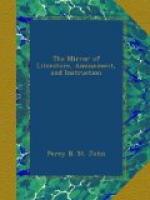A snapper up of unconsidered trifles.
SHAKSPEARE.
* * * * *
On reading in a provincial paper,[3] a passage entitled, “Ornaments of the Bench and Bar.”
Imitate no one you despise,
Said one whose
mind was great,
Did he not think? despise not him
You cannot imitate.
TALBOTE.
[3] The Manchester Courier, 25th July.
* * * * *
SIMPLICITY.
Major R—— was not long since riding near a building which presented to his admiring gaze a fine specimen of antique Saxon architecture. Desirous to learn something respecting it, he made some inquiries of a man, who as it happened was the souter of the village. This learned wight informed the inquisitive stranger that the building in question was reckoned a noble specimen of Gothic architecture, and was built by the Romans, who came over with Julius Caesar. “Friend,” said the Major, “you make anachronisms.” “No, no, Sir,” replied the man, “indeed I don’t make anachronisms, for I never made any thing but shoes in my life.”
The same gentleman, one day fitting on a new under-waistcoat, which he had ordered to be made of a material that should resist rain and damp, said to the tailor in attendance, “But are you sure that it is impervious.” “O dear, no, Sir,” replied the man, with a look of astonishment, “I certainly can’t pretend to say that it is impervious, for it is wash-leather.”
M.L.B.
* * * * *
Some men make a vanity of telling their faults; they are the strangest men in the world; they cannot dissemble; they own it is a folly; they have lost abundance of advantage by it; but if you would give them the world, they cannot help it.
* * * * *
ARLEQUINS.
In Paris, small lumps of mixed meats sold in the market for cats, dogs, and the poor, are called Arlequins. They are the relics collected from the plates of the rich, and from the restaurateurs.
* * * * *
By love’s delightful influence the attack of ill-humour is resisted; the violence of our passions abated; the bitter cup of affliction sweetened; all the injuries of the world alleviated; and the sweetest flowers plentifully strewed along the path of life.
* * * * *
At the meeting on the Covent Garden stage, the other day, a gentleman inquired for Mr. Kemble: “He’s just gone off,” replied another, evidently connected with the theatre. Such is the force of habit.
* * * * *
The late Murgravine of Anspach wrote an impromptu charade, and presented it to her husband, Lord C., as the person most interested in the subject of it, and most capable of judging of its truth:—




